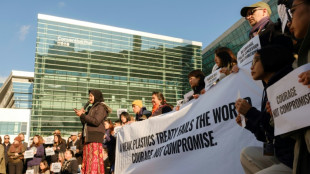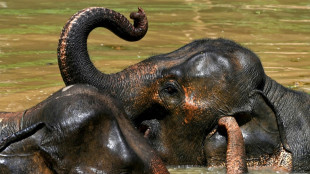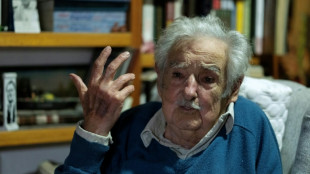
-
 Shiffrin leads Killington giant slalom in pursuit of 100th victory
Shiffrin leads Killington giant slalom in pursuit of 100th victory
-
Kosovo arrests blast suspects, Serbia denies involvement

-
 Las Palmas stun Liga leaders Barca on 125th anniversary
Las Palmas stun Liga leaders Barca on 125th anniversary
-
Piastri wins Qatar Grand Prix sprint as McLaren widen gap on Ferrari

-
 Syria war monitor says rebels control most of Aleppo
Syria war monitor says rebels control most of Aleppo
-
Trudeau meets Trump in Florida as tariff threats loom

-
 Scholz, rival trade blows as German election campaign kicks off
Scholz, rival trade blows as German election campaign kicks off
-
Kosovo races to contain blast impact, Serbia denies involvement

-
 Taiwan's Lai flies to US to start tour of Pacific, angering China
Taiwan's Lai flies to US to start tour of Pacific, angering China
-
South Africa thrash Sri Lanka to fuel World Test Championship bid

-
 Mbappe's problem is Real Madrid's problem, says Ancelotti
Mbappe's problem is Real Madrid's problem, says Ancelotti
-
What do we know about Syrian rebels' major offensive on Aleppo?

-
 South Africa beat Sri Lanka by 233 runs in first Test
South Africa beat Sri Lanka by 233 runs in first Test
-
Incumbent centre-right in 'driving seat' in Irish vote

-
 Georgia arrests 107 more people as pro-EU protests continue
Georgia arrests 107 more people as pro-EU protests continue
-
Taiwan's Lai departs for US stopover during Pacific trip

-
 Kosovo raises security after blast, Serbia denies involvement
Kosovo raises security after blast, Serbia denies involvement
-
More than 122,000 people evacuated in Malaysia due to floods

-
 Vietnam to build $67 bn high-speed railway
Vietnam to build $67 bn high-speed railway
-
Nations warn of deadlock at landmark plastic pollution talks

-
 Taiwan's Lai departs on Pacific island tour
Taiwan's Lai departs on Pacific island tour
-
Syria war monitor says rebels control 'most of' Aleppo city

-
 Greenpeace activists board tanker in plastic protest
Greenpeace activists board tanker in plastic protest
-
Floods displace 122,000 people in Malaysia

-
 Taiwan's Lai set to depart on Pacific island tour
Taiwan's Lai set to depart on Pacific island tour
-
American Johnston reels in Herbert at Australian Open

-
 Hawks top Cavs again to advance in NBA Cup, Boston beat Bulls
Hawks top Cavs again to advance in NBA Cup, Boston beat Bulls
-
South Korea star Jung Woo-sung apologises after baby scandal

-
 Romania's economic troubles fuel far-right rise
Romania's economic troubles fuel far-right rise
-
England on verge of wrapping up first New Zealand Test

-
 Icelanders head to the polls after government collapse
Icelanders head to the polls after government collapse
-
England strike twice to have New Zealand in trouble in first Test

-
 Researchers analyse DNA from dung to save Laos elephants
Researchers analyse DNA from dung to save Laos elephants
-
North Korea's Kim, Russian minister agree to boost military ties

-
 Brook's 171 gives England commanding 151-run lead over New Zealand
Brook's 171 gives England commanding 151-run lead over New Zealand
-
Kamala's coda: What's next for defeated US VP Harris?

-
 Chiefs hold off Raiders to clinch NFL playoff berth
Chiefs hold off Raiders to clinch NFL playoff berth
-
Australia's Hazlewood out of 2nd India Test

-
 Trudeau in Florida to meet Trump as tariff threats loom
Trudeau in Florida to meet Trump as tariff threats loom
-
Jihadists, allies breach Syria's second city in lightning assault

-
 Trudeau in Florida to meet Trump as tariff threats loom: media
Trudeau in Florida to meet Trump as tariff threats loom: media
-
Hunter shines as Hawks top Cavs again

-
 Southampton denied shock Brighton win by dubious VAR call
Southampton denied shock Brighton win by dubious VAR call
-
Alarm over high rate of HIV infections among young women, girls

-
 Swiss unveil Euro 2025 mascot Maddli
Swiss unveil Euro 2025 mascot Maddli
-
Bears fire coach Eberflus after latest agonizing NFL defeat

-
 Rallies mark one month since Spain's catastrophic floods
Rallies mark one month since Spain's catastrophic floods
-
Arnault family's Paris FC takeover completed

-
 Georgian police stage new crackdown on pro-EU protestors
Georgian police stage new crackdown on pro-EU protestors
-
'We're messing up:' Uruguay icon Mujica on strongman rule in Latin America


Ethiopia fractured and fragile after two years of war
Two years after war broke out in northern Ethiopia between federal forces and Tigrayan rebels, the country remains in deep crisis, with its once-vibrant economy in ruins and a humanitarian disaster roiling Tigray.
A breakthrough agreement announced Wednesday between the federal government and Tigrayan regional authorities to cease hostilities has been hailed as "a welcome first step" by UN chief Antonio Guterres but crucial details remain unclear, with no mention of Eritrea, a key player in the conflict.
- 'Half a million dead' -
The war's toll is unknown, but the US envoy to the UN, Linda Thomas-Greenfield, recently said that the devastation and deaths "rival what we're seeing in Ukraine".
"Over two years of conflict, as many as half a million... people have died, and the United States is deeply concerned about the potential for further mass atrocities."
The war erupted on November 4, 2020, following tensions between the federal government and the Tigray People's Liberation Front (TPLF), which dominated Ethiopian politics for nearly three decades until the election of Prime Minister Abiy Ahmed in 2018.
The violence has drawn in regional militias from Amhara and Afar in northern Ethiopia as well as forces from Eritrea, whose leader Isaias Afwerki has a longstanding enmity with the TPLF.
Tigray has faced severe shortages of food and medicines and limited access to electricity, banking and communications, with UN warnings that hundreds of thousands of people were on the brink of famine.
UN investigators have accused Abiy's government of crimes against humanity in Tigray, including the use of starvation as a weapon -- claims rejected by the authorities.
The region of six million people has been largely closed off to the outside world for well over a year, making it very difficult to assess conditions on the ground.
"We will never know the real toll," said Patrick Ferras, a geopolitical researcher and president of Strategies Africaines, who told AFP that at least 300,000 people had likely lost their lives in the conflict.
A military source who spoke to AFP on condition of anonymity said it was impossible to count the fighters involved but analysts believe the number extends into several hundred thousand.
- A fractured country -
The war has exposed underlying fissures within Africa's second most populous nation, with both sides accused of abuses against civilians based on their ethnicity.
A mosaic of more than 80 ethno-linguistic communities, Ethiopia has long struggled to manage the diversity within its borders, with its most populated region Oromia witnessing constant clashes even as the war in Tigray dominates headlines.
Abiy, who was awarded the Nobel Peace Prize for engineering a rapprochement with Eritrea, now presides over a country fractured along ethnic lines.
The non-profit ACLED, which focuses on conflict, has pointed to "rising levels of violence in many areas throughout Ethiopia", singling out the regions of Oromia, Gambella and Benishangul-Gumuz.
With federal forces focused on northern Ethiopia, the risk of violence elsewhere flaring into prolonged instability poses yet another threat to the country of 120 million people.
- An economy in ruins -
When Abiy took the reins in 2018, Ethiopia's economy was growing at breakneck speed, expanding annually by nearly 10 percent from 2010 onwards.
Since then, the economy has encountered several roadblocks, including the war and the Covid pandemic, to name two.
This year GDP is projected to grow less than four percent, according to the International Monetary Fund.
"The economic situation is disastrous," said Ferras.
Annual inflation, which already averaged 13.5 percent between 2010 and 2018, exploded to around 33 percent this year, driven by rising food prices.
"This is largely due to the setbacks of Ethiopian agriculture," a diplomat told AFP on condition of anonymity, referring to a locust invasion, flooding and drought.
The situation will likely worsen as the war in Ukraine drags on, with the Ethiopian currency's value plummeting against the US dollar and the import-dependent nation's foreign exchange reserves drying up.
The IMF estimates that Ethiopia only has enough reserves to pay for about three weeks of imports as it struggles with a shortfall in development aid given by foreign nations.
"Since the beginning of the conflict, Ethiopia has lost half of its official development assistance," the diplomat said.
- Faint hopes for peace -
Even as peace talks opened in South Africa last week, observers were pessimistic, with fighting showing no signs of letting up after a resumption of combat in August shattered a five-month truce.
In recent weeks, federal forces -- backed by Eritrean soldiers -- captured a string of towns in Tigray, piling pressure on the TPLF.
Wednesday's surprise announcement of a deal to end hostilities was greeted with cautious hope, with the United States calling it an "important step towards peace".
But there are "too many unknowns" surrounding the agreement, said Benjamin Petrini, a research fellow at the International Institute for Strategic Studies in Washington.
"If someone wants to be sceptical you would say that solving it all in eight days of negotiations is not a serious effort," Petrini told AFP.
"You may have only scratched the surface."
E.Schubert--BTB

